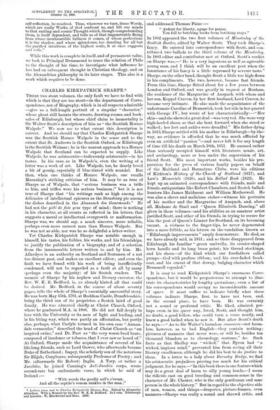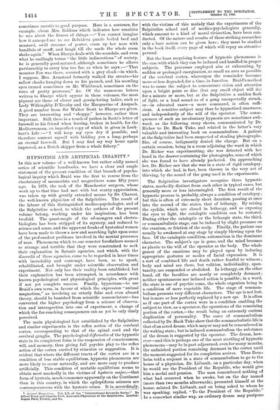CHARLES KIRKPATRICK SHARPE.* THESE two stout volumes, the only fault
we have to find with which is that they are too stout—in the department of Corre- spondence, not of Biography, which is in all respects admirable —give us a full-length portrait of a singular "character," whose ghost still haunts the streets, drawing-rooms, and book- sales of Edinburgh, but whose chief claim to immortality is Sir Walter Scott's description of him as "the Scottish Horace Walpole." We now see to what extent this description is correct. And we should say that Charles Kirkpatrick Sharpe was the Scottish Horace Walpole in the sense and to the extent that St. Andrews is the Scottish Oxford, or Edinburgh is the Scottish Weimar ; he is the nearest approach to a Horace Walpole that Scotland can be expected to supply. Like Walpole, he was aristocratic—ludicrously aristocratic—in his tastes. In his case, as in Walpole's, even the writing of a letter was a work of art. Like Walpole, too, he dearly loved a bit of gossip, especially if blue-tinted with scandal. But then, when one thinks of Horace Walpole, one recalls Macaulay's striking criticism of him. It may be as true of Sharpe as of Walpole, that serious business was a trifle to him, and trifles were his serious business ;" but it is not true of Sharpe that "his writings rank as high among the delicacies of intellectual epicures as the Strasburg pie among the dishes described in the Almanach des Gourmands." He had not the pcite de foie gras type of mind; there is nothing in his character, at all events as reflected in his letters, that suggests a moral or intellectual overgrowth or malformation. Sharpe was, we should say, a much sincerer, more reliable, perhaps even more earnest man than Horace Walpole. But he was not so able, nor was he so delightful a letter-writer.
Yet Charles Kirkpatrick Sharpe was notable enough in himself, his tastes, his foibles, his works, and his friendships, to justify the publication of a biography, and of a selection from the innumerable letters written to and by him. Mr. Allardyce is an authority on Scotland and Scotsmen of a not too distant past, and makes an excellent editor ; and even the fault we have found with his work of being insufficiently condensed, will not be regarded as a fault at all by many (perhaps even the majority) of his Scotch readers. The memoir of Sharpe by his nephew and literary executor, the Rev. W. K. R. Bedford, is, as already hinted, all that could be desired. Mr. Bedford, in the course of about seventy pages, tells the whole of Sharpe's essentially uneventful story. He was born May 15th, 1781, at Hoddam Castle, Dumfriesshire, being the third son of its proprietor, a Scotch laird of good family. He was educated chiefly at Christ Church, Oxford, where he graduated M.A. in 1806. He did not fall deeply in love with the University or its men of light and leading, and in his biting way, which was partly an affectation, but partly also, perhaps, what Carlyle termed in his own case "Annan- dale vernacular," described the head of Christ Church as "an inspired swine," and Dr. Parr as "the very worst-bred brute, composed of insolence or tobacco, that I ever saw or heard of."
At Oxford, Sharpe made the acquaintance of several of his life-long friends, such as Lord Gower, who afterwards became Duke of Sutherland ; Impey, the scholarly son of the notorious Sir Elijah; Conybeare, subsequently Professor of Poetry ; and Mr. (afterwards Sir Robert) Inglis. A Tory, or rather a Jacobite, he joined Canning's Anti-Jacobin corps, wrote second-rate but enthusiastic verse, in which he said of Ireland :— "With weeds the goodly soil's o'erram, And all the reptile's venom rankles in the man
• Letters from and to Charles Kirkpatrick Sharpe. Esq. Edited by Alexander Allardyce. With a Memoir by the Rev. W. K. B. Bedford. In 2 role. Edinburgh and London : W. Blackwood and Sons. 1888.
and addressed Thomas Paine :— "Ardent for liberty, agape for praise,
You fell to botching books from botching stays." In 1802 appeared the two first volumes of Minstrelsy of the Scottish Border, edited by Walter Scott. They took Sharpe's fancy. He entered into correspondence with Scott, and con- tributed two ballads to the third volume of the Minstrelsy. In 1803 editor and contributor met at Oxford. Scott's verdict on Sharpe was,—" He is a very ingenious as well as agreeable young man, and I think will be an excellent poet when the luxuriance of his fancy is a little repressed by severer taste." Sharpe, on the other hand, thought Scott a little too high-flown in his compliments. The two, however, became fast friends. From this time, Sharpe flitted about for a few years between London and Oxford, and was greatly in request at Benham, the residence of the Margravine of Anspach, with whom and her son, Keppel Craven, by her first husband, Lord Craven, he became very intimate. He also made the acquaintance of the unfortunate Caroline of Brunswick, took her side in her quarrel with George IV., but wrote of her characteristically:—" Her skin—and she showed a great deal—was very red. She wore very high-heeled shoes, so that she bent forward when she stood or walked; her feet and ankles were dreadful." His father dying in 1813, Sharpe settled with his mother in Edinburgh—by-the- way, no evidence is afforded that he was much afflicted by even an artificial "passion "—and never left it for any length of time till his death on March 18th, 1851. He amused rather than seriously occupied himself with literature, music, art, and archa3ology, more or less under the supervision of his friend Scott. His most important works, besides his pre- paration for the press of various family papers on behalf of the Maitland and Bannaty-ne Clubs, were his editions of Kirkton's History of the Church of Scotland (1817), and Law's Memorials (1820), and his Ballad Book (1823). He kept up an animated correspondence with friends, male and female, antiquarians like Robert Chambers, and Scotch ballad- hunters like James Maidment and William Motherwell. He was also a clever and malicious etcher—witness his portraits of his mother and the Margravine of A.nspach, and, above all, Madame de Stael and "Queen Elizabeth Dancing," all given in these volumes—and his abilities as an amateur artist justified Scott, and other of his friends, in trying to secure for him the post of Queen's Limner for Scotland, on its becoming vacant. A virtuoso to the finger-tips, he never degenerated into a mere fribble, as his letters on the vandalism known as Edinburgh improvements" amply demonstrate. He died, as we have already said, in 1851; and so there disappeared from Edinburgh his familiar" green umbrella, its crosier-shaped horn handle and its long brass point; his thread stockings, and his shoes—of the kind which our forefathers called pumps—tied with profuse ribbon ; and his ever-faded frock- coat, and his cravat of that downy, bulging character which Brummell repealed."
It is easy to read Kirkpatrick Sharpe's enormous Corre- spondence, but it would be preposterous to attempt to illus- trate its characteristics by lengthy quotations ; even a list of his correspondents would occupy no inconsiderable amount of space. It must suffice to indicate briefly what these volumes indicate Sharpe, first, to have not been, and, in the second place, to have been. He was certainly not a sound or profound critic. He liked, admired, per- haps even, in his queer way, loved, Scott, and thought him, no doubt, a good fellow, who could turn a verse neatly, and knew a good ballad when he saw it. But after Scott's death he says :—" As to Sir Walter's harmless romances—not harm- less, however, as to bad English—they contain nothing; pictures of manners that never were, or will be, besides ten thousand blunders as to chronology, costume," &c. Such facts as that Shelley was "wicked," that Byron had "a wicked, impious mind," prevented him from seeing all their literary excellences, although he did his best to do justice to them. In a letter to a lady about Barnaby Budge, we find his aristocratic prejudices proving too much for his critical judgment, for he says,—"In this book there is one feature which may do a great deal of harm to silly young heads,—I mean the ridicule cast on good breeding and common-sense in the character of Mr. Chester, who is the only gentleman and sane person in the whole history." But in regard to the objective side of men, women, and things—draperies, picture-frames, even raanners—Sharpe was really a sound and shrewd critic, and
sometimes caustic to good purpose. Here is a sentence, for example, about Mrs. Siddons which indicates how sensitive he was about the fitness of things :—" You cannot imagine how it annoyed me to see Belvidera guzzle boiled beef and mustard, swill streams of porter, cram up her nose with handfuls of snuff, and laugh till she made the whole room shake again." When Sharpe deals with the scandals, and even what he smilingly terms "the little indiscretions" of society, he is generally good-natured, although sometimes he allows partisanship to carry him too far, as when he says :—" That monster Fox was there, covered with a grey cloak—in which, I suppose, Mrs. Armstead formerly walked the streets—his sallow cheeks hanging clown to his paunch, and his scowling eyes turned sometimes on Mr. Whitbread, sometimes on the rows of pretty peeresses," &c. Of the numerous letters written to Sharpe which appear in these volumes, the most piquant are those of clever and gossip-loving ladies, such as Lady Willoughby D'Eresby and the Margravine of Anspach. A good number from Sir Walter Scott to Sharpe are given. They are interesting and " shoppy," however, rather than important. Still, there is a touch of pathos in Scott's letter of farewell to his friend when leaving, broken in health, for the Mediterranean, an imperfect copy of which is given in Lock- hart's Life :—" I will keep my eyes dry if possible, and therefore content myself with bidding you a long, perhaps an eternal farewell. But I may find my way home again improved, as a Dutch skipper from a whale fishery."



















































 Previous page
Previous page